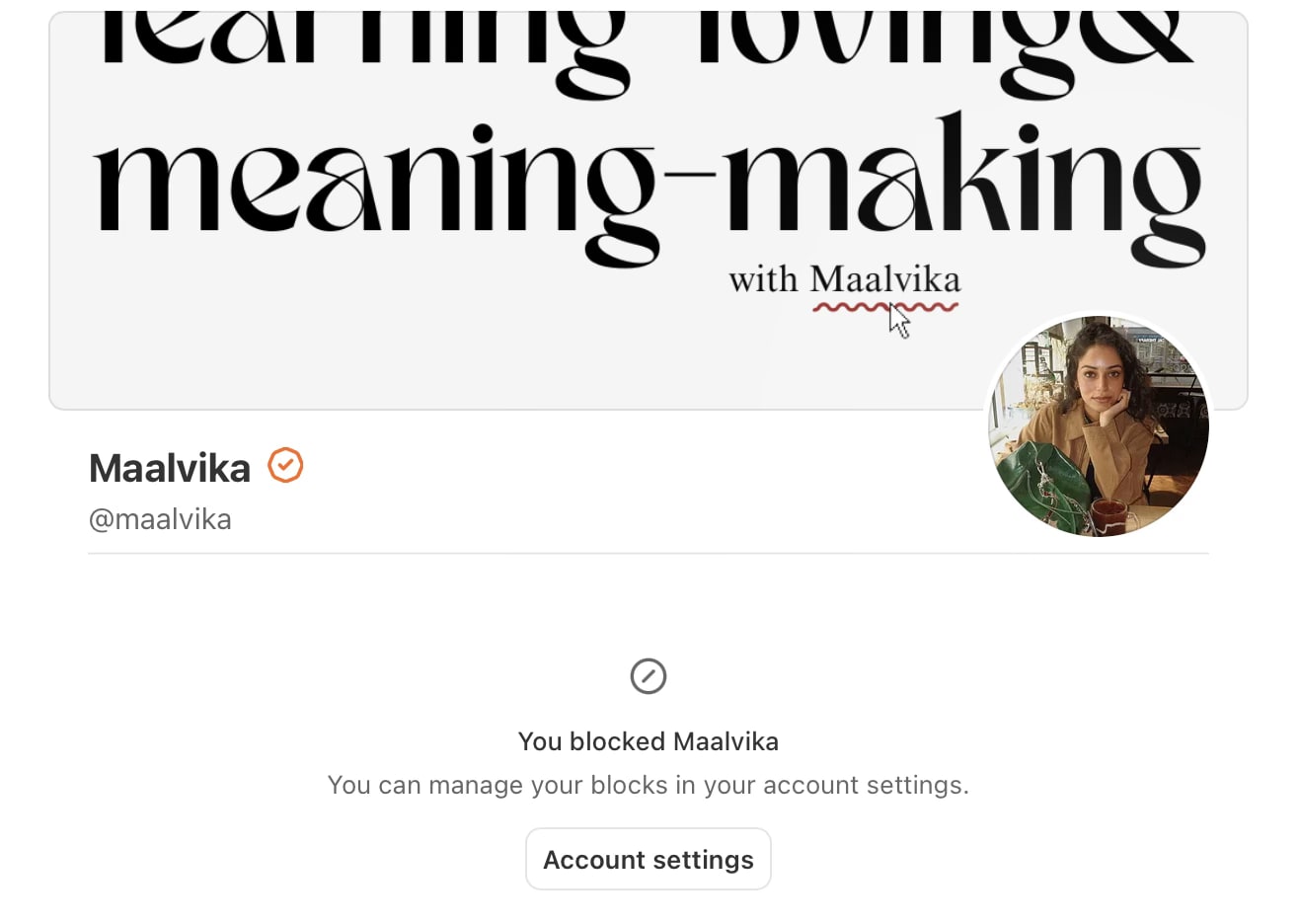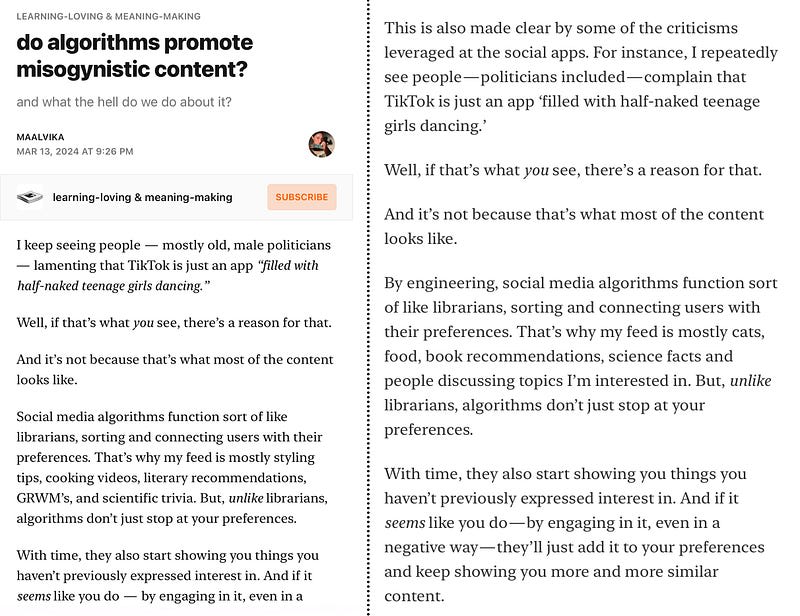Around a year ago, I opened the TikTok app and was served a video of
discussing an essay she’d just published. ‘It’s my most well-researched Substack,’ she announced proudly, before diving into the ideas and evidence she’d supposedly compiled.
Only they weren’t her ideas.
And they weren’t her words.
And it wasn’t her research — it was mine.
For a second there, I genuinely thought I was losing it. Am I about to morph into a cockroach? Is this some nightmare loosely based on Yellowface by R.F. Kuang? Had I only hallucinated writing this piece altogether, and this woman was the rightful author all along?
I quickly pulled up my essay, published on February 9th, and then hers, published March 13th. The title was different, though it conveyed the same idea; however, the body was a near copy-paste job, with a few bits removed or changed and some words swapped out, I guess to make it seem ‘different’ enough. But it wasn’t. My observations, metaphors, italicised emphasis (!), and the research I’d gathered stared back at me from her page, and I wanted to scream MINE! over and over again, like the seagulls in Finding Nemo.
I got angry then angrier and angrier. Her video was racking up thousands of views and likes, and ‘her’ Substack post was gaining traction, too. I then checked out her other work and — surprise, surprise — there it was again: entire paragraphs lifted from other writers, including
. I reported her profile and the article. Multiple times. She eventually did remove it, but I never heard a word from Substack.
Still fuming, but desperate to protect my sanity (and blood pressure), I blocked her; at least she won’t be able to steal from me again, I thought. But then I started seeing ‘her’ articles popping up all over my Substack feed.
And guess what?
She’s now listed as the #1 New Bestseller here.
If you’re a writer, the above likely reads like a horror story.
And if it’s happened to you too, I’m so, so sorry. I feel your frustration, your rage, your disbelief at the sheer audacity of those who steal — and the helplessness that follows when you realise how little recourse we really have. Far too many writers I know have been through it as well.
Sadly, this isn’t even my first rodeo either. I’ve had entire articles lifted before — sometimes multiple at once — and reposted, unashamedly, into the Digital Wild West. In fact, it happened just two weeks ago — this time on Medium.
The algorithmic gods who rule our online feeds might indeed function sort of like librarians, connecting us with things we’ve shown interest in, but, unlike librarians, they largely don’t care what they surface or why. Too often, they also end up behaving more like carnival bakers, pushing the loudest, simplest, and most emotionally charged content, regardless of whether it’s accurate, highly polarising, or remotely original. The result is pretty predictable: crap piled on crap, layered with even more crap, until the whole thing starts to reek — and once you catch its vile stench, you can’t un-smell it. At least I know I can’t.
In a letter published last year in Nature Human Behavior, a group of scientists warned that our information space is becoming dangerously polluted, making it harder and harder to actually process what we’re seeing, let alone sort the good from the bad — all the plagiarism, mis- and dis-information, low-quality news, spam, AI slop, etc., etc. According to a recent study by researchers at Amazon Web Services, roughly 57% of the content online right now is already either AI-generated or translated through an AI algorithm. Some other estimates suggest that by 2026, this could rise to a staggering 90%. Add in the rest of the digital pollutants and, well, you’ve got a full-blown swamp. Stinky, murky, and taking up an ever-larger share of what we see and hear online.
And this isn’t just bad for writers, artists, and other creatives, who now have to twist themselves into pretzels and be a marketer, an influencer, and a content strategist all in one — oh, and somehow still find time to, you know, create — just to make their work barely visible through the muck.
It’s bad for everyone.
Ironically, the excerpts from my plagiarist’s recent work, which have been steadily shoved down my throat for weeks now, are all about the dangers of ‘compression culture’ and the importance of slowing down and truly appreciating the things we consume. (Or so it seems — I haven’t read the whole piece because I have her blocked. Also, it’s apparently behind a paywall.)
You know what’s also a perfect example of this ‘compression culture’? Stealing someone else’s words because you’re too impatient to get those precious likes and follows and money and be able to call yourself a ‘writer’ when you haven’t actually put in any work to be one.
Still, she — or whoever truly deserves credit for the piece — isn’t wrong. I’ve written about this very topic before, too. Much of our world is rushed, sped up, bite-sized, and delivered straight to our impatient neurons on a golden platter of instant gratification. We sprint from one thing to the next, and we barely set aside any time to pause. And eventually, maybe we stop even wanting to. We just keep scrolling and reposting and reacting and doing whatever else the pace of the machine nudges us to do. Onto the next shiny thing. And the next. And the next.
How are we then supposed to tell the good from the rotten, the authentic from the fake voices?
How can we even know what we truly think or feel if we never give ourselves time to chew on what we just consumed?
And how are we meant to generate anything genuinely new, anything that might bring humanity a step closer to a better, more just world, if all we see, and all we are, are copies of copies, reheated over and over again, stripped of nuance, soul, and humanness?
A wealth of research now shows that information overload can lead to emotional exhaustion, burnout, poor decision-making, as well as a change in cognitive performance, sometimes significant. A recent MIT study on the impact of popular AI tools, like ChatGPT, on students’ brains also found that relying too heavily on AI for writing tasks can reduce brain activity and memory function, leading to what they call ‘cognitive debt.’
There’s a real danger in allowing our online environment to become so thoroughly polluted with digital sludge — and then rewarding people for pumping out more of it.
Alas, to some extent, that’s already happened.
Something has to be really, really broken for someone who blatantly plagiarises to become a bestseller. Or perhaps nothing’s broken at all, and things are working exactly as they’re meant to. Perhaps this is just another stage in the enshittification process Cory Doctorow warned us about.
The sad truth, though, is that people who show up authentically online can’t easily compete with plagiarists, AI-slop merchants, and all the other similar creatures scuttling around. I, for one, am not a team of people. I’m not several rats in a trench coat. I’m just one person, one human. And I care about the things I put into the world; I care about accuracy, fairness, and proper referencing. In other words, I can’t publish often enough for the algorithms to go bananas over my work — or, at least, not as bananas as they go for those who cut corners.
Because it’s not the act of writing itself that takes the most time. It’s everything else. It’s reading and researching and note-compiling and talking to people or peers and staring at the wall and taking long walks and playing with my cat and so on, and so on. To paraphrase David McCullough, writing is mostly thinking. But if you skip the latter, and rely on others — or the machines — to do the former, you’re not a writer. At best, you’re a replicator. At worst, you’re a thief.
It’s a sober, depressing realisation, and one I imagine many others have felt when something similar happened to them, that doing the work the right way often means being left behind. And if you happen to be a woman, as I am, it also means being subjected to near-constant misogyny and sexual harassment just for showing up and speaking out. Sometimes, it really is all too much. At this point, I think I’d rather send people interested in my work a weekly pigeon carrying a photocopy of my handwritten piece. But I don’t know how to do that. How to escape this game. At least not yet.
In the meantime, if you, dear reader, care about people like me — and so, so many others: brilliant, thoughtful, passionate creatives on this platform and all over the internet — please support them, however you can.
And if you smell the stink, call it out.
P.S. A massive thank you to everyone who’s already reached out and reported this ‘writer.’ Your support and kind words mean the world to me. And if you value my work, please consider liking or sharing this post — or becoming a paid subscriber.
Thank you!
.png)




![DARPA Lift Challenge [video]](https://www.youtube.com/img/desktop/supported_browsers/firefox.png)

